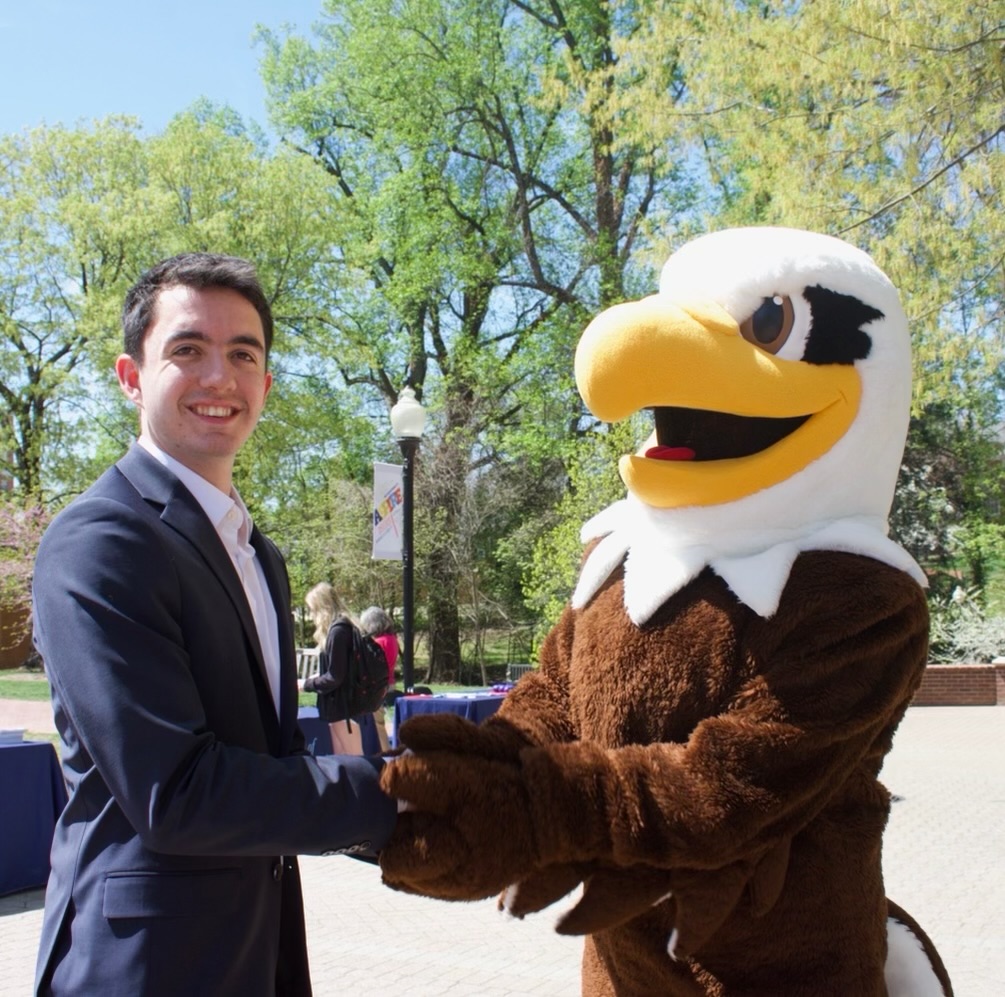UMW senior Devin Schwers leads grassroots write-in campaign for Soil and Water Conservation Director
4 min read
Devin Schwers is running a write-in campaign to be the next Soil and Water Conservation Director. | Photo courtesy of Devin Schwers
by NORAH WALSH
Editor-in-Chief
Devin Schwers, a senior political science major at UMW, is running a write-in campaign to be the next Soil and Water Conservation Director for the Tri-County/City District. The incumbent candidate, Charles “Chuck” Koch, is running uncontested, which is one of the many aspects that led to Schwers’ write-in campaign.
According to the Soil and Water Conservation District Director’s Handbook, “[Directors] voluntarily assess local conservation needs and encourage cooperative efforts in achieving district conservation goals.”
The Handbook outlines a series of roles and responsibilities of the director, which include being a representative of citizens in conservation issues, fostering discussion within the community about soil and water matters and establishing policies and programs to meet needs pertaining to soil and water within the district.
The position is an unpaid, elected position with no party affiliation, which means that a D, R or I will not appear next to the candidate’s name on the ballot. As Schwers is running a write-in campaign, his name will not appear on the actual ballot, but voters will be able to write in his name on their ballots should they choose to vote for him. Furthermore, the Fredericksburg Democratic Committee—who has endorsed Schwers—will also offer sample ballots at the polls that list Schwers’ name.
“[W]ith the write-in campaign, your name is not printed on the official ballot, and voters have to write your full legal name that you registered with, and they have to write it correctly,” said Schwers. He added that the spelling of his name is essential, as if it is misspelled, the vote will not count.
Koch won the race in the last election with 20 write-in votes, according to Schwers, so the race has the potential to be close, even with a write-in campaign on Schwers’ end.
As a political science major, the campaign started as a suggestion in gest among Schwers’ friends, but when they realized that it was an uncontested race and considered the importance of the environment, the plan to actually run the write-in campaign came to fruition.
“I think the environment is one of the number one issues for especially young people,” said Schwers. “I think right now it polls as definitely the top three issues for our generation, and I can absolutely assure you that 20 years time from now, it will be the hot topic issue for everybody.”
Schwers highlights his youth, being an environmentalist and his passion to enact change as three aspects that he brings to the table as a candidate. He acknowledged that he did not study environmental sciences and explained how he would bridge that gap.
“I think with the help of people who are frankly a lot smarter than me and a lot more well-versed in this topic than I am, I can bring them to the table as far as that,” he said.
About the position, Schwers reflected on the power to enact change with the help of students and experts in environmental fields, which he has already begun through the assistance of fellow students.
Schwers said, “I have a buddy who studies agriculture at Purdue, and he’s sending me articles upon articles about soil and light. I never thought I’d be like this … I’m not a stem guy.”
As for issues that he would like to address if elected, Schwers spoke on development.
“One of the big issues that I am aware of walking into this is Fredericksburg is a city that’s expanding incredibly fast,” he said. “There’s a lot of new development all the time, which is terrific … But one of the issues that comes with that is whether or not we’re developing responsibly, because with improper development, erosion is absolutely a consequence.”
In light of this, Schwers proposed possible plans to help encourage sustainability in the area.
“I want to help create incentives with the city of Fredericksburg and local businesses, whether that’s a tax incentive or whatever else,” he said. “[T]hat way businesses are using our natural resources responsibly and engaging in safe practices with our natural resources and in our environment.”
He also spoke on the importance of bringing light to topics of sustainability, which is a pinnacle of his campaign.
“I think, slowly, as we get these ideas out in the public and we encourage people to behave a certain way and we teach people why their behavior and even the most menial aspects of their life make large differences—I think once we start to get that narrative out, once we start to shape that public narrative, that’s when we’ll begin to see a real change,” said Schwers.
“I have a lot of faith in my generation, but also the generation that comes after me,” he said. “And so one of the things that I would really like to do … is connecting with children in our public school system and engaging with them and teaching them the importance of natural resources.”
Several people have been involved with Schwers’ campaign, such as Ranjit Singh, associate professor in the department of political science and international affairs. Schwers is currently taking Singh’s class on environmental activism, which led to him talking about the campaign with Singh, who has since lent his support.
Kate McDaid, a UMW alumna who worked on Ben Litchfield’s State Senate campaign with Schwers, is helping the campaign in several ways as well, including running the Instagram page @devinfxbg, which includes information about the position, as well as the campaign itself.


